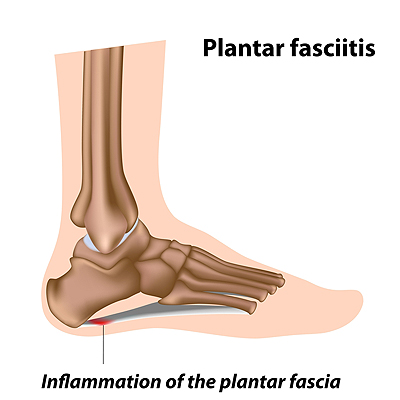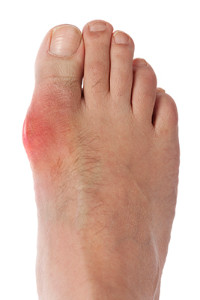
Drexel Hill (484) 521-0233
West Chester (610) 436-5883

Drexel Hill (484) 521-0233
West Chester (610) 436-5883
 Many people who suffer from foot pain are diagnosed with plantar fasciitis, but what is it? Plantar fasciitis is the inflammation of the plantar fascia ligament in the heel. Symptoms consist of a stabbing or burning pain in the heel, which tends to worsen from overuse. Thankfully, it is a condition that can be treated. Typical causes of plantar fasciitis include repetitive movements from athletic activities, flat feet, obesity, age, and poor footwear. If you think you suffer from plantar fasciitis, see a podiatrist for a diagnosis. Treatment can include a simple change in footwear, orthotics, keeping pressure off the foot, and corticosteroids. Plantar fasciitis can be painful, but it is treatable with proper care.
Many people who suffer from foot pain are diagnosed with plantar fasciitis, but what is it? Plantar fasciitis is the inflammation of the plantar fascia ligament in the heel. Symptoms consist of a stabbing or burning pain in the heel, which tends to worsen from overuse. Thankfully, it is a condition that can be treated. Typical causes of plantar fasciitis include repetitive movements from athletic activities, flat feet, obesity, age, and poor footwear. If you think you suffer from plantar fasciitis, see a podiatrist for a diagnosis. Treatment can include a simple change in footwear, orthotics, keeping pressure off the foot, and corticosteroids. Plantar fasciitis can be painful, but it is treatable with proper care.
Plantar fasciitis can be very painful and inconvenient. If you are experiencing heel pain or symptoms of plantar fasciitis, contact the podiatrists from Dr. Siegerman & Associates. Our doctors can provide the care you need to keep you pain-free and on your feet.
What Is Plantar Fasciitis?
Plantar fasciitis is the inflammation of the thick band of tissue that runs along the bottom of your foot, known as the plantar fascia, and causes mild to severe heel pain.
What Causes Plantar Fasciitis?
How Can It Be Treated?
While very treatable, plantar fasciitis is definitely not something that should be ignored. Especially in severe cases, speaking to your doctor right away is highly recommended to avoid complications and severe heel pain. Your podiatrist can work with you to provide the appropriate treatment options tailored to your condition.
If you have any questions please feel free to contact one of our offices located in Drexel Hill and West Chester, PA . We offer the newest diagnostic and treatment technologies for all your foot and ankle needs.
Read more about Plantar Fasciitis Gout, a form of arthritis caused by uric acid crystals forming in joints, can be very painful and can occur in any joint in the body. Thankfully, gout can be managed with a good diet. Avoiding high intakes of acid-rich food is advised. Purines, which are converted into uric acid by the body, come from animal and plant foods. Purine-rich diets, especially from meat and seafood, increase the risk of gout attacks. While not completely preventing gout attacks, diets with plenty of vegetables do help. Low-fat dairy products have been found to prevent uric acid buildup as well. Alcohol has also been linked with dramatically increased rates of gout attacks, so cutting back on alcohol is a great way to prevent gout attacks. While improving your diet won’t eliminate gout, it will certainly help to lessen attacks and their effects.
Gout, a form of arthritis caused by uric acid crystals forming in joints, can be very painful and can occur in any joint in the body. Thankfully, gout can be managed with a good diet. Avoiding high intakes of acid-rich food is advised. Purines, which are converted into uric acid by the body, come from animal and plant foods. Purine-rich diets, especially from meat and seafood, increase the risk of gout attacks. While not completely preventing gout attacks, diets with plenty of vegetables do help. Low-fat dairy products have been found to prevent uric acid buildup as well. Alcohol has also been linked with dramatically increased rates of gout attacks, so cutting back on alcohol is a great way to prevent gout attacks. While improving your diet won’t eliminate gout, it will certainly help to lessen attacks and their effects.
Gout is a foot condition that requires certain treatment and care. If you are seeking treatment, contact the podiatrists from Dr. Siegerman & Associates. Our doctors will treat your foot and ankle needs.
What Is Gout?
Gout is a type of arthritis caused by a buildup of uric acid in the bloodstream. It often develops in the foot, especially the big toe area, although it can manifest in other parts of the body as well. Gout can make walking and standing very painful and is especially common in diabetics and the obese.
People typically get gout because of a poor diet. Genetic predisposition is also a factor. The children of parents who have had gout frequently have a chance of developing it themselves.
Gout can easily be identified by redness and inflammation of the big toe and the surrounding areas of the foot. Other symptoms include extreme fatigue, joint pain, and running high fevers. Sometimes corticosteroid drugs can be prescribed to treat gout, but the best way to combat this disease is to get more exercise and eat a better diet.
If you have any questions please feel free to contact one of our offices located in Drexel Hill and West Chester, PA . We offer the newest diagnostic and treatment technologies for all your foot and ankle needs.
 Diabetes presents a number of problems for those who have it. This is especially true for children, who are more likely to sustain a foot injury from playing. Due to decreased sensitivity, a child may not realize they have a wound and not tell their parent. Coupled with poor blood circulation, the wound may not heal and may become infected; this could be very dangerous and, in extreme cases, potentially result in amputation. Both parents and children should know what to look for and how to care for diabetic feet. This includes doing daily foot inspections for wounds or any abnormal signs. Diabetic children should wash their feet with warm water and make sure to dry them properly. Make sure to avoid extremely hot and cold environments, and check the water temperature first before washing. Children should also avoid walking barefoot. Be sure to inspect shoes for any objects inside and to ensure the interior is smooth. Finally, seeing a podiatrist for an examination several times a year is highly recommended.
Diabetes presents a number of problems for those who have it. This is especially true for children, who are more likely to sustain a foot injury from playing. Due to decreased sensitivity, a child may not realize they have a wound and not tell their parent. Coupled with poor blood circulation, the wound may not heal and may become infected; this could be very dangerous and, in extreme cases, potentially result in amputation. Both parents and children should know what to look for and how to care for diabetic feet. This includes doing daily foot inspections for wounds or any abnormal signs. Diabetic children should wash their feet with warm water and make sure to dry them properly. Make sure to avoid extremely hot and cold environments, and check the water temperature first before washing. Children should also avoid walking barefoot. Be sure to inspect shoes for any objects inside and to ensure the interior is smooth. Finally, seeing a podiatrist for an examination several times a year is highly recommended.
Making sure that your children maintain good foot health is very important as they grow. If you have any questions, contact the podiatrists of Dr. Siegerman & Associates. Our doctors can provide the care you need to keep you pain-free and on your feet.
Keeping Children's Feet Healthy
Having healthy feet during childhood can help prevent medical problems later in life, namely in the back and legs. As children grow, their feet require different types of care. Here are some things to consider...
Although babies do not walk yet, it is still very important to take care of their feet.
Avoid putting tight shoes or socks on his or her feet.
Allow the baby to stretch and kick his or her feet to feel comfortable.
As a toddler, kids are now on the move and begin to develop differently. At this age, toddlers are getting a feel for walking, so don’t be alarmed if your toddler is unsteady or ‘walks funny’.
As your child gets older, it is important to teach them how to take care of their feet.
Show them proper hygiene to prevent infections such as fungus.
Be watchful for any pain or injury.
Have all injuries checked by a doctor as soon as possible.
Comfortable, protective shoes should always be worn, especially at play.
If you have any questions please feel free to contact one of our offices located in Drexel Hill and West Chester, PA . We offer the newest diagnostic and treatment technologies for all your foot and ankle needs.
 Compared to younger athletes, elderly athletes are more likely to suffer a foot injury as they get older. Foot conditions and injuries that affect all ages include plantar fasciitis, ankle sprains, stress fractures, and Morton’s neuroma. While the sport one plays can vary, there are certain things that athletes of all ages can do to prevent foot injuries. Wearing an ankle brace can help prevent sprains, while quality footwear can prevent foot pain. Proper arch support can be the difference between comfort and discomfort. Custom orthotics may be necessary for some people who have flat or unsupported feet. Stretching is vital, and everyone should stretch not only before an activity but after as well. Finally, keeping your feet dry by changing socks and using foot powder can prevent conditions like athlete’s foot. If you are an elderly athlete, be sure to see a podiatrist to see if certain activities are right for you.
Compared to younger athletes, elderly athletes are more likely to suffer a foot injury as they get older. Foot conditions and injuries that affect all ages include plantar fasciitis, ankle sprains, stress fractures, and Morton’s neuroma. While the sport one plays can vary, there are certain things that athletes of all ages can do to prevent foot injuries. Wearing an ankle brace can help prevent sprains, while quality footwear can prevent foot pain. Proper arch support can be the difference between comfort and discomfort. Custom orthotics may be necessary for some people who have flat or unsupported feet. Stretching is vital, and everyone should stretch not only before an activity but after as well. Finally, keeping your feet dry by changing socks and using foot powder can prevent conditions like athlete’s foot. If you are an elderly athlete, be sure to see a podiatrist to see if certain activities are right for you.
Proper foot care is something many older adults forget to consider. If you have any concerns about your feet and ankles, contact the podiatrists from Dr. Siegerman & Associates. Our doctors can provide the care you need to keep you pain-free and on your feet.
The Elderly and Their Feet
As we age we start to notice many changes in our body, but the elder population may not notice them right away. Medical conditions may prevent the elderly to take notice of their foot health right away. Poor vision is a lead contributor to not taking action for the elderly.
Common Conditions
Susceptible Infections
Diabetes and poor circulation can cause general loss of sensitivity over the years, turning a simple cut into a serious issue.
If you have any questions please feel free to contact one of our offices located in Drexel Hill and West Chester, PA . We offer the newest diagnostic and treatment technologies for all your foot and ankle needs.
Request a free copy of
Laser Away Foot Pain!
today.
